- Home
- Beverly Cleary
Ramona's World Page 2
Ramona's World Read online
Page 2
Mrs. Quimby held out her arms for Roberta, who snuggled against her mother’s shoulder. “Sh-h-h,” whispered her mother. Roberta stopped crying with one last hiccuping sob. “That’s my good girl,” whispered Mrs. Quimby, and she too kissed the baby’s hair.
All this made Ramona feel worse than ever—unloved, left out, and a rotten speller with the whole horrible fourth grade ahead of her. Nobody kissed her hair, at least today, and it was clean, too. She pulled herself out of the chair, found the remote control, and turned on the television to a rerun of her favorite after-school program, Big Hospital. She wanted to forget her troubles and lose herself in the corridors of the hospital where people in green pajamas fell in love if they weren’t too busy saving lives or comforting the lost and lonely.
“Ramona, please turn that off.” Mrs. Quimby looked over Roberta’s head at her middle daughter. “I wish you’d tell me what’s bothering you.”
“Nothing’s bothering me,” grumped Ramona as she pushed the button on the remote control without finding out what Handsome Doctor and Blond Nurse would say next. She waited for her mother to coax her problems out of her, to soothe her, to tell her things would be better tomorrow, and maybe even kiss her hair. She picked at a callus but did not pull it off. Calluses were one thing she had to be proud of. Right now she felt they were the only thing.
Before Mrs. Quimby could coax, the telephone rang. “I’ll get it!” Beezus shouted. She and Ramona usually tried to beat each other to the telephone in the hall.
Of course, Ramona eavesdropped. She heard Beezus say, sounding surprised, “Yes, I’d love to, but I’ll have to ask Mother. Just a minute—”
Beezus, her eyes shining and her face alight with joy, came back into the room and said, “Mother, guess what! Mrs. Lucas wants me to baby-sit with Benjamin Saturday evening. They won’t be out late, and they’ll pay me and everything!”
And stuff, thought Ramona.
Beezus continued. “And Mrs. Lucas says she wants me because she knows I’m responsible. Oh, please, please—”
“I don’t see why not,” said Mrs. Quimby. “We’ll be home, so we could help if there is an emergency, which I’m sure there won’t be.”
Not with good old Beezus being so responsible all over the place, thought Ramona as Beezus danced off to the telephone. After she had accepted the offer, she returned, gathered up her books, and started down the hall to the room the sisters had shared since Roberta was born. The baby now occupied Ramona’s old room.
Beezus paused and said, “Au revoir.”
“What does that mean?” asked Ramona, annoyed with Beezus for using words she did not understand.
“It means good-bye in French,” answered Beezus, and went off to the room the sisters shared. Probably to be responsible about her homework, thought Ramona.
Mrs. Quimby shifted Roberta to her lap and patted the couch beside her. “Ramona, come sit by me,” she coaxed.
Reluctantly Ramona moved to the couch, staying as far away as she could from her mother. She balanced the heel of one sandal on the toe of the other and longed to lean against her mother and confide her troubles. Life was hard enough, and now Beezus would be showing off by speaking French. She picked at a callus.
“Can you tell me what’s bothering you?” Mrs. Quimby’s voice was gentle. Roberta stared at Ramona as if she were giving her serious thought.
“Nothing.” Ramona sighed.
“Now, Ramona,” her mother said in her soothing voice, “I know something’s bothering you. You’ll feel better if you tell me.”
Ramona knew her mother was right, but she sighed again before she burst out, “My spelling is rotten and Mrs. Meacham doesn’t like me and makes me feel stupid in front of the whole class and they laughed at me and made me feel super-stupid and everybody says Beezus is responsible and nobody says I’m responsible and everybody fusses over Roberta and says she is cute and adorable and stuff and nobody pays any attention to me and I’m not supposed to say ‘stuff’ and—and—stuff.”
Roberta looked worried.
Mrs. Quimby ignored the stuffs. “Has anybody ever said you weren’t responsible?” she asked.
Ramona thought. “Well—no,” she admitted, “but Mrs. Meacham probably will. She only likes people who can spell. She loves good spellers. She adores good spellers.”
Mrs. Quimby smiled. “Ramona, I think you are exaggerating.”
Ramona knew her mother was right, but that was the way she felt. Exaggerating felt good.
“Bring your spelling words home, and we’ll help you.” Mrs. Quimby was comforting, but Ramona was not ready to be comforted. “And don’t forget,” her mother went on, “this is only the second day of school, and Mrs. Meacham is there to teach you. You’ll feel differently when you get to know her better and when your spelling improves.”
Ramona felt calmer after spilling out her troubles, but she wasn’t ready to admit it. How did she know her spelling would improve? It might get worse. Roberta stared as if she were trying to understand. Ramona stared back, still engulfed in self-pity, and thought, I wish somebody would call me darling and adorable like Roberta. But no, I’m just plain old messy Ramona. She stuck her tongue out at Roberta and immediately felt ashamed of herself. Her sweet innocent baby sister—
Then, to Ramona’s astonishment, Roberta stuck her tongue out at Ramona. Ramona couldn’t believe it. Roberta was too little to understand. It must have been a coincidence. As an experiment Ramona stuck her tongue out again. Roberta smiled a real smile and stuck her tongue out again. It was a game. Ramona could scarcely believe what she had seen. “Mother, did you see that?” she asked in wonder. “Roberta stuck her tongue out when I stuck my tongue out, and she smiled, really smiled, like it was some kind of game.”
Mrs. Quimby laughed. “I told you Roberta would take after you.”
“But she’s so awfully little,” said Ramona, still marveling.
“Babies are more observant than we realize,” said Mrs. Quimby.
Ramona’s troubles seemed to vanish. She had taught her baby sister to stick out her tongue. She could teach her other things when she was older, things like playing tic-tac-toe and roller-skating. As for spelling—pooh! Mrs. Meacham was just another teacher. Ramona had survived others, liked them, and even loved her kindergarten teacher. She would survive Mrs. Meacham, maybe get to like her, even though at the moment this seemed doubtful. Ramona didn’t care. Suddenly the sun was shining—it had shone all day, but Ramona hadn’t noticed, since she had gone to school—and now Roberta had copied her by sticking out her tongue.
Ramona felt so good she held up her finger to Roberta, who grasped it in her tiny perfect hand. “See,” Ramona said to her mother, “I really am Roberta’s role model.” Then, in spite of herself, Ramona thought, r-o-l-e m-o-d-e-l.
3
AT DAISY’S HOUSE
As September sunshine changed to autumn clouds, life at the Quimbys’ house settled into a peaceful routine. Mr. Quimby, who managed the ShopRite Market, came home from work looking cheerful. Groceries had been delivered on time, no shoplifters were spotted, and no one had slipped on bits of lettuce dropped by careless produce customers.
Mrs. Quimby found more time to read Moby Dick, a book with so many pages that members of the book club, most of them mothers or women who worked outside their homes or both, had difficulty finishing it. They postponed their meeting for another month. Ramona wondered why they didn’t just skip the hard parts.
Roberta was a happy baby, busy enjoying her hands and feet. She could even put her toes in her mouth. So could Ramona, just barely, but no one else in the family even tried.
Beezus was still filled with enthusiasm for high school. She liked all her teachers, and she had made a new friend, Abby Alexander, whose real name was Abigail. At dinnertime the Quimbys heard a lot about Abby: Abby wanted to be a math teacher or a dietician someday, Abby’s mother got her contact lenses, Abby got an A on her math test, Abby this and Abby that.
> All this left Ramona full of wishes. She sighed a lot and wished she had long hair like Daisy, and even though she had no need for them she wished she had bands on her teeth. She unfolded a paper clip, held the wire in front of her mouth, and smiled at herself in the mirror to see what she would look like if she wore bands. She wished she were a better speller without having to work at it, she wished Yard Ape would pay as much attention to her in school as on the bus, but most of all she wished there were girls her age on Klickitat Street. She wanted girls to play with. She wanted a best friend. That was why she ran all the way home from the bus stop one afternoon. She had news. A wish might be about to come true.
“Guess what!” she cried as she burst through the door and found her mother folding diapers on the living room couch. They were diapers Ramona had worn, but she didn’t like to think about that. Paper diapers were expensive, she knew.
“What am I to guess?” Mrs. Quimby was interested but not excited. After all, she had known Ramona for nine years.
Ramona was glad Roberta was still napping, so she could have her mother all to herself. She took a deep breath and began, “Daisy Kidd, the new girl in my class I told you about—you know, the one with long hair and braces on her teeth—wants me to come home with her on the bus after school tomorrow! Her mother will bring me home after dinner.”
Mrs. Quimby pulled a diaper out of the jumble beside her and flapped it to shake out the wrinkles, but before she could answer, Ramona went on, “Please, please, Mother. I never get to play with a girl because there aren’t any girls around here except Willa Jean, who doesn’t count because she is only in kindergarten and besides, she’s a nuisance, and Daisy is lots of fun and she’s a good speller and is a really, really nice girl, so she must have really, really nice parents and—”
Mrs. Quimby calmly folded the diaper as she interrupted. “Of course you may go, dear. I already know about Daisy’s family because one of the book club members’ cousins lives next door to her family and says they are fine people. Daisy’s father was transferred here during the summer, and her mother works mornings as a school nurse.” Obviously the conversation of the book club was not limited to books.
Somehow Ramona felt let down. She had expected to argue, to have to persuade her mother of the niceness of Daisy and the importance of their playing together.
“You could have asked Daisy to come here,” Mrs. Quimby said.
“Oh. I didn’t think about it,” admitted Ramona. “I guess because we ride different buses.”
Mrs. Quimby laid down the diaper she was folding to look thoughtfully at Ramona before she said, “Don’t you think you should play with Susan once in a while?”
Ramona picked at the one callus that had not peeled off since school started before she said, “Do I have to? I see her at Sunday school.”
Mrs. Quimby said, “You could ask her to come here or you could go to Susan’s house. Her mother was saying just the other day that you girls should get together more often.”
Ramona made a face. She wished grown-ups would stay out of their children’s affairs.
Mrs. Quimby was curious. “Don’t you like Susan?” she asked.
“Well—not really,” confessed Ramona. “She’s the kind of girl who gets mad, really mad, when boys call her Snoozin’ Susan. When boys call you a name, you are just supposed to get a little bit mad and not go telling the teacher.” Ramona found her reason for disliking Susan difficult to explain. “And I don’t like to go to her house because—well, it is too clean, I guess.”
Mrs. Quimby looked surprised. “You can’t say that about our house.”
Ramona was loyal to her house. “Our house isn’t dirty,” she said. “There are magazines and stu—things on the coffee table, but everything isn’t all nicey-nice and just so, and you don’t hang around talking when someone comes over. You mind your own business.”
“Thank you, dear.” Mrs. Quimby’s mouth was serious, but her eyes were smiling. “I’m glad to know.”
The evening could not pass fast enough for Ramona. The next afternoon she was filled with excitement as she climbed with Daisy onto the bus. After showing her permission note to the driver, the girls found seats together. Ramona felt as if she were about to have an adventure. Although she was familiar with the streets they rode through, somehow they seemed different when seen from someone else’s school bus. “I feel like I’m really going someplace,” she told Daisy. She had never been so far from home without an adult before.
“You are going someplace,” said Daisy. “To my house.” Both girls found this funny.
Daisy’s house turned out to be an old two-story house on the other side of the high school. The girls were greeted by a friendly tail-wagging dog, a sort of collie. Daisy patted and introduced him. “This is Mutley. My brother Jeremy found him abandoned in the park.”
“Hi, Mutley.” said Ramona. The dog seemed pleased.
Daisy’s house had a pleasant fragrance, something like cookies, and was comfortably untidy. There were still packing boxes in the corner of the living room, and a vacuum cleaner and its attachments lay nearby. A cat dozed in a patch of sunlight and opened one eye to look at Ramona.
Daisy’s mother, who was plump, looked younger than her hair, which was gray, long, and held back with a clasp. “Welcome, Ramona,” she said as she looked up from a box filled with dishes, crumpled newspaper, and bubble wrap. “What nice shoes you’re wearing.”
Ramona looked down at her shoes, surprised by their niceness.
Mrs. Kidd continued, “Daisy needs new shoes, but we’re not familiar with stores around here. Where do you buy your shoes?”
Ramona knew right away that she liked Mrs. Kidd. Not every mother who asked questions really wanted to know the answer. Mrs. Kidd plainly was not a person who asked children how they liked school or what they wanted to be when they grew up. “Fix yourselves a snack,” she said, and pulled a platter out of a carton. “I hope I can get all these packing boxes out of the living room before Daisy goes to high school.” Obviously she was a mother who knew how to mind her own business.
Daisy picked up the large, limp cat that was almost too heavy for her. “This is Clawed,” she said. “C-l-a-w-e-d,” she spelled. “Not like a man’s name. My brother named him Clawed because he had been clawed by another cat when he found him hiding in a gutter. Daddy says he hopes Jeremy never finds a wounded skunk.”
Ramona stroked Clawed’s fur. He was such a nice comfortable cat, unlike Picky-picky, the cat the Quimbys had once had. Daisy returned him to his patch of sunshine before she led the way to the kitchen, where she found juice bars in the refrigerator, another good sign, Ramona thought. Susan’s mother provided apples or a glass of milk and graham crackers for an after-school snack. While the girls were busy licking their juice bars, Daisy’s brother came in the back door, dropped his book bag on the floor, and said, “Hi, Fence Face,” to Daisy as he opened the refrigerator. “And you must be the Ramona we’ve heard too much about.” He began to throw together a sandwich.
“That’s my brother Germy,” said Daisy. “He thinks he’s a genius because he’s in high school.”
“Jeremy,” corrected the brother to Ramona and added, “Tinsel Teeth,” to his sister. With that he took his sloppy sandwich and a dill pickle into the living room, where he turned on the television to a sports channel.
Daisy made a face. “I wanted to watch Big Hospital. That’s my favorite program.”
“Mine too,” said Ramona. Sharing a favorite made her feel closer to Daisy.
When the girls had finished their juice bars, Daisy said, “Come on, let’s vacuum Clawed. He loves to be vacuumed.” Jeremy, who had picked up the cat, was sitting on the couch with his feet on the coffee table. Mrs. Kidd, busy unpacking dishes, did not seem to mind. Daisy seized the vacuum cleaner and pulled it toward Clawed, who jumped off Jeremy’s lap as if he expected it. “Here, you do it,” Daisy said, and thrust the vacuum cleaner hose at Ramona as she turned on the vacuu
m cleaner. “He likes the upholstery attachments. I guess you could say he is upholstered in fur.”
Clawed did not run as Ramona expected, but stood bracing himself with his chin raised as if he was enjoying the feel of the attachment Ramona was running down his back. “Some cat,” said Ramona.
“Here, let me have a turn,” said Daisy, taking the vacuum cleaner from Ramona. Clawed rolled over on his back to allow her to vacuum his soft underneath fur. Ramona was amazed. Picky-picky would never have stood for such a thing. She said so.
“Clawed is a smart cat,” Daisy explained. “He knows he won’t have to scratch fleas if we run the vacuum cleaner over him.” When she finished, Clawed went back to his patch of sunshine. The girls entertained themselves by popping bubbles in the bubble wrap while Mrs. Kidd carried cartons to the basement. Mutley went to the door and whimpered. Jeremy picked up a leash by the front door and took his dog outside.
“Quick!” directed Daisy. “Before he gets back.” She seized the remote control and switched the television from the sports channel to Big Hospital. “Pretend we’ve been watching it all along.” The girls settled themselves on the couch and tried to look as if they had been there for some time. When Jeremy returned, Daisy looked up from the screen and, pretending to be surprised to see her brother, said, “Oh, hi, Jeremy.”
“Okay, Fence Face, you win,” said Jeremy, and went thumping up the stairs to his room. Mutley flattened himself, his nose on his paws, in front of the television set. When Daisy was sure the coast was clear and the girls had suppressed their giggles, she went to the refrigerator for a second helping of juice bars.
Ramona and Daisy contentedly licked their juice bars as they watched Handsome Doctor and Blond Nurse and a number of other people in green pajamas save the life of a little boy who had been hit by a car while playing in the street. His weeping mother, holding the ball he had been chasing, watched through a window on the swinging door.

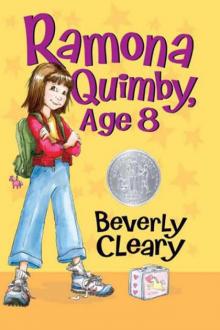 Ramona Quimby, Age 8
Ramona Quimby, Age 8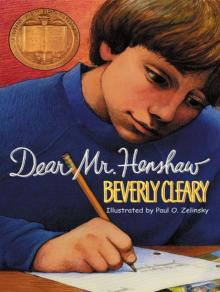 Dear Mr. Henshaw
Dear Mr. Henshaw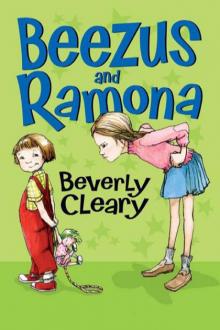 Beezus and Ramona
Beezus and Ramona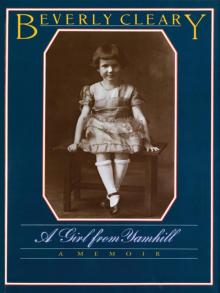 A Girl from Yamhill
A Girl from Yamhill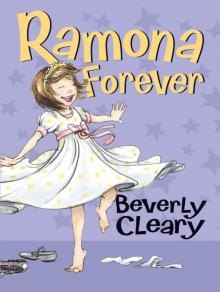 Ramona Forever
Ramona Forever Jean and Johnny
Jean and Johnny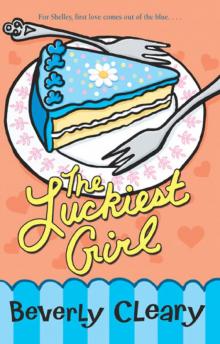 The Luckiest Girl
The Luckiest Girl Emily's Runaway Imagination
Emily's Runaway Imagination Ribsy
Ribsy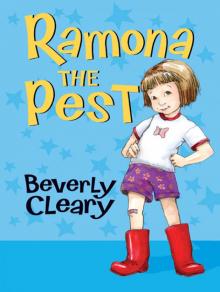 Ramona the Pest
Ramona the Pest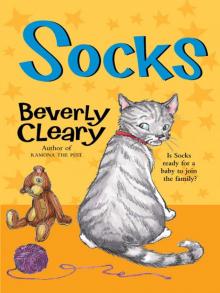 Socks
Socks Ramona's World
Ramona's World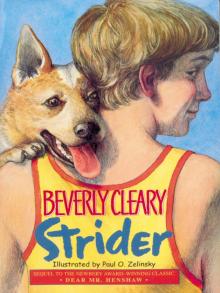 Strider
Strider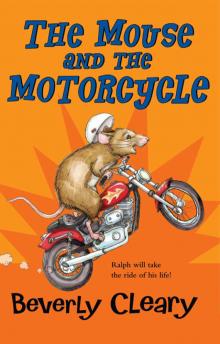 The Mouse and the Motorcycle
The Mouse and the Motorcycle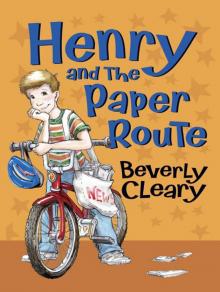 Henry and the Paper Route
Henry and the Paper Route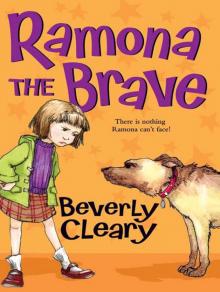 Ramona the Brave
Ramona the Brave Henry Huggins
Henry Huggins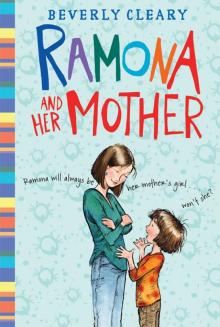 Ramona and Her Mother
Ramona and Her Mother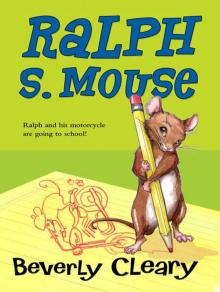 Ralph S. Mouse
Ralph S. Mouse Sister of the Bride
Sister of the Bride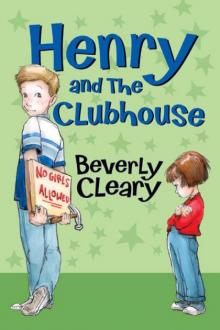 Henry and the Clubhouse
Henry and the Clubhouse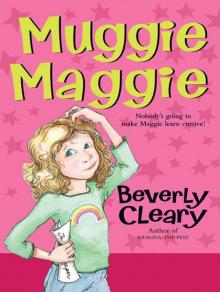 Muggie Maggie
Muggie Maggie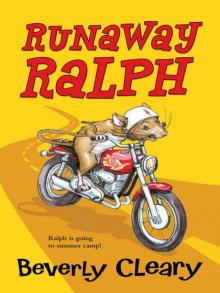 Runaway Ralph
Runaway Ralph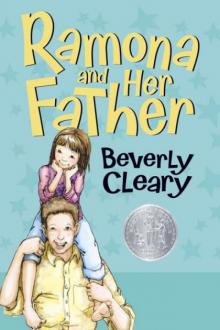 Ramona and Her Father
Ramona and Her Father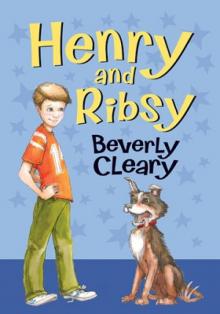 Henry and Ribsy
Henry and Ribsy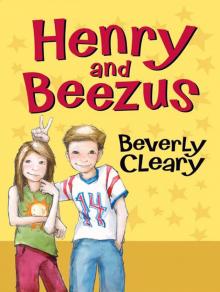 Henry and Beezus
Henry and Beezus Two Times the Fun
Two Times the Fun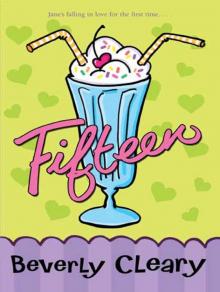 Fifteen
Fifteen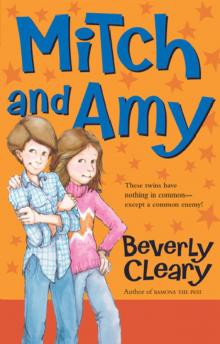 Mitch and Amy
Mitch and Amy